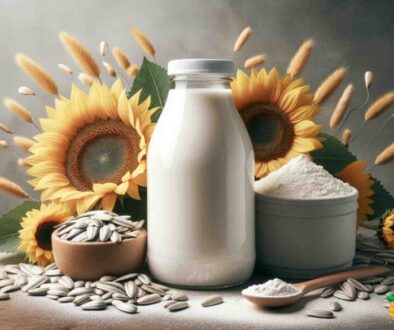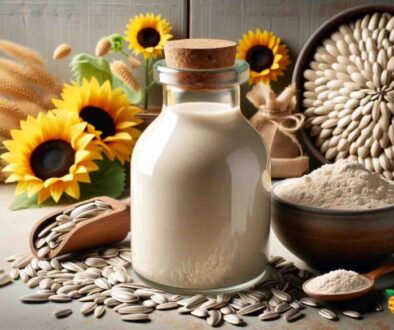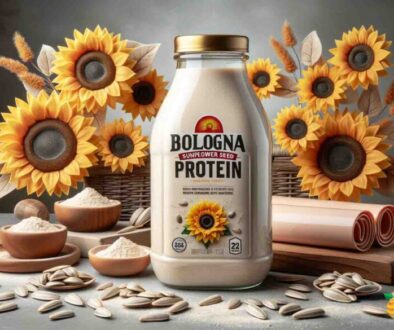Sunflower Seed Protein: Unveiling Its Nutritional Benefits
Elevate nutrition with sunflower seed protein—high globulin content, excellent absorption. Enhance recipes, boost health. Discover the power of sunflower protein!
Sunflower seed protein also known as sunflower seed kernel protein or sunflower protein, is derived from the defatted sunflower seed cake. It is a protein product obtained by removing the shell and phenolic acid compounds such as chlorogenic acid and caffeic acid from the sunflower seed cake. The primary components include globulins (approximately 70% to 79%), followed by albumins, and small amounts of glutelins and prolamin. The content of lysine is relatively low, while other essential amino acids are present in higher quantities.

Protein Composition
Domestic sunflower seeds contain protein ranging from 21% to 30%, and after oil extraction, sunflower seed cake typically contains over 50% protein. The protein composition of sunflower seeds includes approximately 55% to 60% globulins, 17% to 23% albumins, 1% to 4% prolamin, and 11% to 17% glutelins. The non-protein nitrogen and insoluble residues combined are less than 11% of the total nitrogen content. Sunflower seed protein has solubility in water, salt solutions, and ethanol solutions at 20%, 50% to 60%, and 3%, respectively. Qualitative analyses using gel chromatography, ultrafiltration, electrophoresis, etc., reveal a molecular mass range of 10 to 450 kDa for sunflower seed protein, with the main component at 125 kDa and an average mass of 180 kDa, comprising 6 to 7 protein components. Studies indicate that sunflower seed protein is primarily composed of 7-8S and 11-12S components, with an isoelectric point at pH 4.0.
Nutritional Characteristics
The chemical composition of sunflower seeds varies depending on the variety and growing conditions. Typically, domestically produced sunflower seeds contain 40% to 68% fat, 21% to 30% protein, 2.0% to 6.5% carbohydrates, 6.0% crude fiber, and ash content ranging from 5.4% to 32%. Sunflower seed protein has a higher content of sulfur-containing amino acids, such as methionine, compared to most plant proteins, contributing to its good digestibility (90%) and higher biological value (60%).
Physiological Functions
Sunflower seed protein exhibits excellent water absorption, oil absorption, emulsifying, and foaming properties. Sunflower seed powder can absorb 170% water and 208% oil, with higher oil absorption compared to soybean protein. Sunflower seed concentrated and isolated proteins have foaming and stirring properties similar to fresh egg whites.
Preparation of Sunflower Seed Protein
Preparation of Sunflower Seed Concentrated Protein
The process involves grinding the sunflower seed cake after oil extraction, extracting with solvents such as 70% ethanol and acid solution to remove chlorogenic acid, water-soluble sugars, and inorganic salts. The resulting solution is then concentrated using a process similar to soybean protein production.
Preparation of Sunflower Seed Isolated Protein
After removing the large outer shell from the low-temperature defatted sunflower seed cake, the remaining material is ground, placed in an extraction tank, and subjected to vacuum extraction with a 1:40 ethanol-water solution to remove chlorogenic acid, water-soluble sugars, and inorganic salts. The extracted protein solution is adjusted to pH 4-4.2 with 0.5 mol/L HCl, allowed to settle, and the precipitated protein is separated, homogenized, and spray-dried to obtain isolated protein.
Factors Affecting Protein Quality
Sunflower seeds contain phenolic compounds such as chlorogenic acid and caffeic acid, which can adversely affect protein quality. These compounds can oxidize rapidly under alkaline and high-temperature conditions, resulting in the discoloration of proteins. Additionally, chlorogenic acid can inhibit pepsin, necessitating its removal.
Applications
- General Food Use: Adding 1%-2% defatted sunflower seed protein powder to foods, such as bread, after wet heating for one hour can enhance nutritional content, compensate for deficient essential amino acids in flour, and improve the elasticity of baked goods, preventing starch aging.
- Infant Food Additive: Sunflower seed protein, when combined with soybean protein, can be added to infant and toddler foods to enhance nutritional value, compensating for the lower lysine content of sunflower seed protein with the higher methionine content.
- Meat Product Additive: Adding sunflower seed protein to meat products like sausages improves shrinkage during smoking, prevents fat separation, reduces weight loss, and enhances tenderness. Incorporating sunflower seed tissue protein (30%) into fillings for pies, buns, and dumplings can replace pork, reducing animal fat content and overall costs.
Elevate Your Nutrition with ETprotein’s Sunflower Seed Protein
As we delve into the myriad benefits of sunflower seed protein, it’s essential to highlight ETprotein’s exceptional offering in this realm. ETprotein’s sunflower seed protein stands out for its superior quality and nutrient profile, ensuring a reliable source of essential amino acids, especially in lysine-deficient diets. With a focus on purity and effectiveness, ETprotein’s dedication to extracting the best from sunflower seeds results in a product that excels in water absorption, oil absorption, and overall nutritional enhancement. Elevate your culinary creations and nutritional intake by choosing ETprotein’s sunflower seed protein—an epitome of excellence in plant-based protein supplementation.












